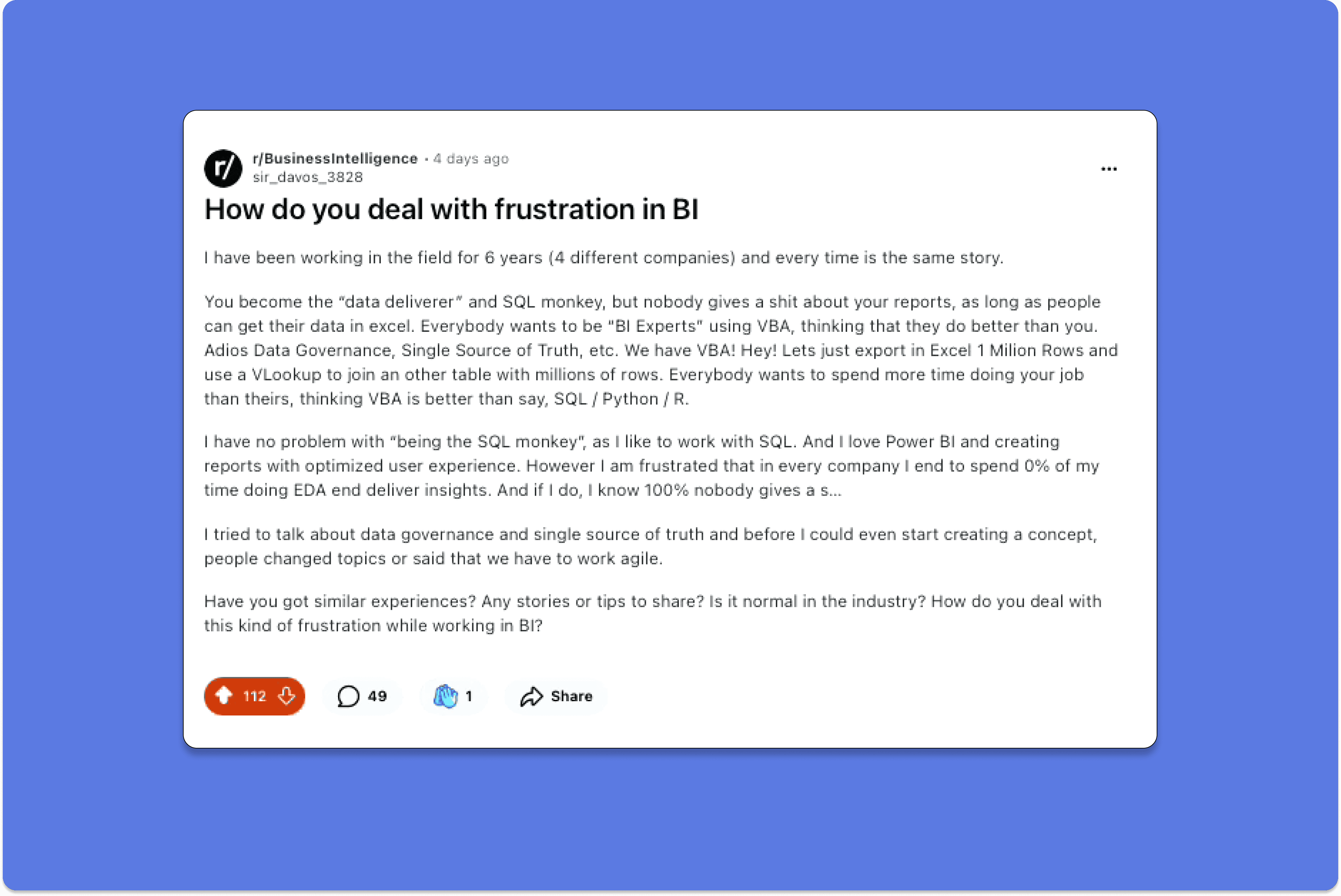Community Conversations: How Long Until We Admit We Just Want Dashboards?
Tom Killeen
Could it be true?
Where traditional reporting and dashboarding is manual, less dynamic and self-contained, RAG (Retrieval Augmented Generation) seeks to improve the quality of generated text by incorporating external information.
But, as you can see, it’s got its critics.
Should analysts just accept their reliance on traditional reports and dashboards? Or is there an alternative that can drive better business outcomes?
The Quest for High-Value Decision-Making Tools
RAG faces several critiques, often due to its reliance on generative AI models that can produce inaccurate or misleading information. The frequency of 'hallucination' means that RAG models can easily generate answers that sound plausible but are incorrect, leading to a lack of trust among data professionals. Furthermore, RAG often prioritises speed over depth, resulting in superficial insights lacking the context for strategic decision-making.
Analytics should empower decision-makers with insights that drive action, but not at the expense of accuracy. RAG still appears to lack the reliability needed to inform complex, business strategies. Reports and dashboards ultimately provide superior context, historical trends, and actionable insights, albeit at the expense of the time and effort of an analyst.
The Lasting Power of Dashboards and Reports
Anecdotally, dashboards and reports remain the most trusted, simplest and most effective tools for data-driven decision-making. The dashboards offer real-time visibility into business metrics, while reports deliver deeper analyses that guide strategy. Their reliability and familiarity still make them indispensable in many businesses.
A marketing team can use dashboards for instant metrics like reach and engagement. However, a detailed report can provide insights into audience behaviour and recommendations, offering more value in the long run, certainly than a quicker RAG-based response.
Natural Language Querying: An Accessible Alternative
Let’s introduce a third option.
Compared to RAG, NLQ allows users to interact with data directly through everyday language, making complex data more accessible without relying heavily on generative AI. It’s designed to translate natural language into database queries for data retrieval. This reduces the risk of incorrect answers and enables users to explore data independently, providing a more transparent and reliable insight path.
Compared to traditional reporting, NLQ adds a layer of accessibility that allows users to interact with data more intuitively. Traditional reports require analysts to both proactively and reactively build and update them. NLQ provides a flexible approach where users can ask new questions without waiting for a report refresh or custom development. Advanced NLQ systems could identify patterns overlooked by human analysts, adding more ‘value per query’ (and not at the expense of accuracy).
The Reliability Issue with AI
Adopting AI-driven analytics like RAG and NLQ involves several challenges, especially in maintaining trust. While typically less appealing to non-technical users, detailed reporting or controlled dashboards won’t be caught hallucinating. So, if AI has similar governance or guardrails to defend against its worst traits, like hallucinations, maybe the argument of ‘what analysts actually want’ becomes less of a debate.
Conclusion
RAG offers speed, but its role as the ultimate game-changer in analytics is debatable. Traditional dashboards and reports can be hugely enhanced with reliable NLQ, but for now, they remain the foundation of effective decision-making because they can be trusted the most.
While we all agree the data supporting decision-making should be accurate, decisions become much more powerful when they can be made quickly, which is something AI is great at enabling. Truth is, analysts don’t want to keep serving reports and dashboards; they just want a solution they can trust enough to do it for them.



